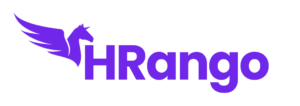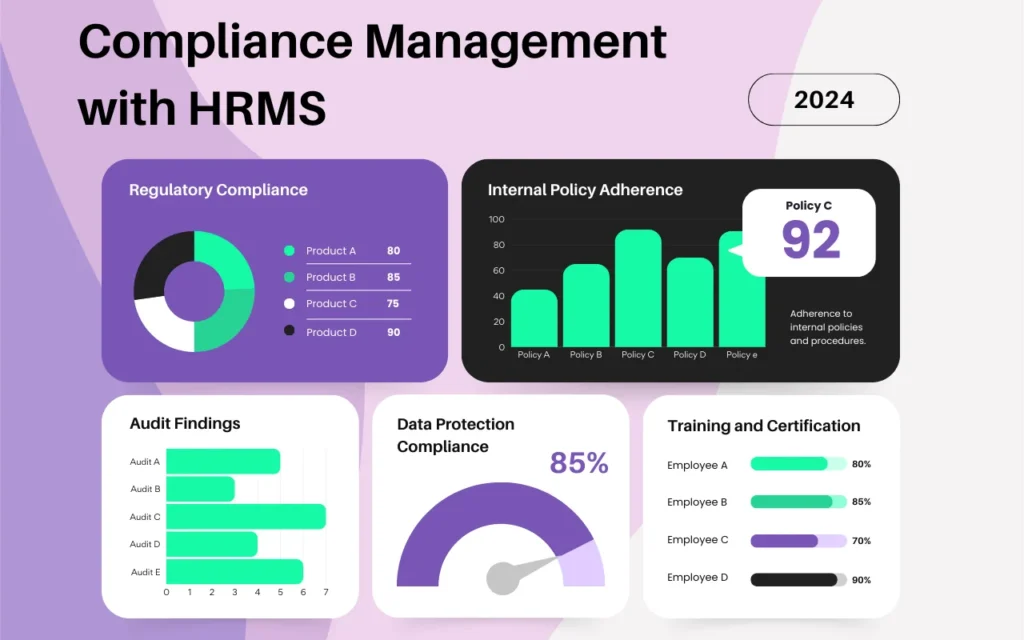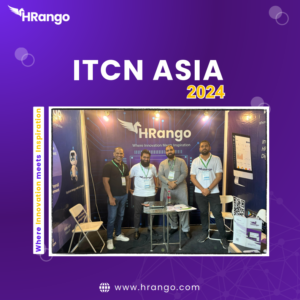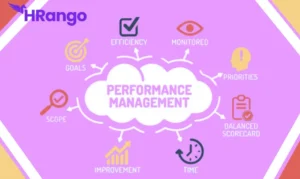Introduction
Compliance management with HRMS is a critical aspect of Human Resources (HR) that ensures businesses adhere to the ever-evolving legal and regulatory requirements. With the increasing complexity of labor laws, data protection regulations, and workplace safety standards, managing compliance manually has become nearly impossible. This is where Human Resource Management Systems (HRMS) like HRango come into play. HRMS platforms not only streamline HR processes but also play a crucial role in helping businesses stay compliant with regulations, reducing the risk of penalties and legal issues. In this article, we will explore how HRMS can be leveraged for effective compliance management, with a focus on HRango’s capabilities.
What is Compliance Management in HR?
Compliance management in HR involves ensuring that all HR practices and policies are in line with the legal and regulatory requirements. This includes a wide range of activities such as maintaining accurate employee records, adhering to labor laws, ensuring workplace safety, and protecting employee data. Effective compliance management with HRango minimizes the risk of legal actions against the company and helps maintain a positive reputation.
Key areas of HR compliance include:
- Labor Laws: Ensuring compliance with wage and hour laws, employee classification, and anti-discrimination regulations.
- Data Protection: Safeguarding employee data in accordance with regulations like GDPR.
- Workplace Safety: Adhering to occupational safety and health regulations.
Challenges in Compliance Management
Managing compliance in HR is fraught with challenges, especially as regulations continue to evolve and vary across different jurisdictions. Some of the primary challenges include:
- Evolving Regulations and Legal Requirements: Keeping up with changes in laws and regulations can be overwhelming, particularly for businesses operating in multiple regions.
- Managing Multi-Jurisdictional Compliance: Companies with a global workforce must comply with local, state, and federal laws, which can vary significantly.
- Ensuring Consistent Policy Enforcement: It’s crucial to ensure that compliance policies are uniformly enforced across the organization, regardless of location or department.
How HRMS Supports Compliance Management
An HRMS like HRango offers several tools and features that simplify compliance management, ensuring that businesses remain in line with legal requirements.
- Centralized Data Storage and Access: HRMS platforms provide a centralized repository for all employee data, making it easier to store, access, and manage records in compliance with legal standards.
- Automation of Compliance Tasks: HRMS automates many routine compliance tasks, such as tracking employee certifications or generating compliance reports, reducing the risk of human error.
- Real-Time Monitoring and Reporting: HRMS platforms can monitor compliance in real-time, providing alerts and notifications when potential issues arise, ensuring timely corrective actions.
Key Compliance Features in HRMS
When selecting an HRMS for compliance management, it’s essential to look for key features that will help you stay ahead of regulations:
- Document Management and Record-Keeping: HRMS platforms like HRango allow for secure storage and easy retrieval of employee documents, ensuring that records are always up-to-date and accessible for audits.
- Automated Alerts and Notifications: HRango can send automated alerts for upcoming compliance deadlines, such as renewing certifications or updating legal documents.
- Audit Trails and Reporting: Comprehensive audit trails in HRango help track changes in employee records, providing transparency and accountability.
- Policy Management and Dissemination: HRango enables businesses to create, update, and distribute company policies easily, ensuring all employees are informed of the latest regulations.
- Employee Training and Certification Tracking: HRango tracks employee training and certifications, ensuring that all staff members meet the required standards.
HRango: A Case Study in Compliance Management
HRango is a leading HRMS platform that excels in compliance management. Its comprehensive suite of tools and features ensures that businesses can easily manage and stay on top of compliance requirements.
Overview of HRango’s Compliance Features:
HRango offers a range of compliance-focused features, including automated alerts, document management, and customizable reporting tools. These features are designed to help businesses maintain compliance with minimal manual intervention.
How HRango Helps Businesses Stay Compliant:
By automating routine compliance tasks and providing real-time monitoring, HRango reduces the risk of non-compliance. For example, HRango’s automated alert system ensures that HR teams are notified well in advance of upcoming compliance deadlines, preventing costly oversights.
User Testimonials and Success Stories:
Many HRango users have reported significant improvements in compliance management after implementing the platform. For instance, a mid-sized company noted a 40% reduction in compliance-related issues within the first year of using HRango, thanks to its robust reporting and automation features.
The Role of HRMS in Multi-Jurisdictional Compliance
For businesses operating across multiple regions, managing compliance can be particularly challenging. HRMS platforms like HRango are equipped to handle these complexities:
- Managing Local, State, and Federal Regulations: HRango allows businesses to manage compliance across different jurisdictions by customizing compliance rules and policies according to local regulations.
- HRango’s Tools for Global Compliance Management: HRango offers tools that help global businesses stay compliant with varying labor laws, data protection regulations, and workplace safety standards across different regions.
Data Security and Privacy Compliance with HRMS
Data protection is a critical component of compliance management, especially with regulations like GDPR enforcing strict data privacy standards.
- Importance of Data Protection in Compliance: Ensuring the security and privacy of employee data is essential to avoid legal penalties and maintain trust with employees.
- How HRango Ensures Data Security and Privacy: HRango employs robust security measures, including encryption, access controls, and regular security audits, to protect sensitive employee data.
- Meeting GDPR and Other Data Protection Standards: HRango is designed to help businesses comply with GDPR and other data protection regulations by providing tools for data management, consent tracking, and secure storage.
HRMS and Labor Law Compliance
Labor laws govern a wide range of HR practices, from employee classification to wage and hour regulations. HRMS platforms like HRango simplify the management of these complex requirements:
- Wage and Hour Law Compliance: HRango tracks employee work hours and overtime, ensuring compliance with wage and hour laws.
- Employee Classification and Overtime Tracking: HRango helps businesses manage employee classification and track overtime to prevent legal disputes.
- HRango’s Features for Managing Labor Law Compliance: HRango’s reporting tools provide detailed insights into employee work hours, classifications, and pay, helping businesses stay compliant with labor laws.
Employee Training and Compliance
Ongoing employee training is essential for maintaining compliance, particularly in industries with stringent regulatory requirements. HRango offers tools to ensure that employees are properly trained and certified:
- Ensuring Ongoing Compliance Through Training: HRango tracks employee training progress and certifications, ensuring that all required training is completed on time.
- Tracking Certifications and Training Completion with HRango: HRango’s certification tracking features make it easy to monitor employee compliance with mandatory training and certifications.
Compliance Reporting and Documentation
Accurate reporting and documentation are crucial for demonstrating compliance during audits. HRMS platforms like HRango simplify these processes:
- Generating Compliance Reports with HRMS: HRango allows businesses to generate comprehensive compliance reports quickly and easily, ensuring that all necessary information is readily available for audits.
- Storing and Managing Documentation for Audits: HRango’s document management features ensure that all compliance-related documents are securely stored and easily accessible.
- HRango’s Reporting Tools for Easy Compliance Audits: HRango’s customizable reporting tools make it easy to generate the specific reports needed for compliance audits, reducing the time and effort required.
Benefits of Using HRMS for Compliance Management
Leveraging an HRMS like HRango for compliance management offers several significant benefits:
- Reducing Risk of Non-Compliance Penalties: By automating compliance tasks and providing real-time monitoring, HRango helps businesses avoid costly penalties for non-compliance.
- Streamlining Compliance Processes: HRango simplifies compliance management by automating routine tasks and centralizing data, making it easier to stay compliant.
- Improving Accuracy and Efficiency in Compliance Tasks: Automation and real-time monitoring reduce the risk of errors, ensuring that compliance tasks are completed accurately and efficiently.
Challenges of Implementing Compliance Management in HRMS
While HRMS platforms like HRango offer many advantages, there are also challenges to consider when implementing compliance management:
- Customizing HRMS for Specific Compliance Needs: Businesses may need to customize their HRMS to meet specific compliance requirements, which can be time-consuming.
- Ensuring Employee Adoption and Proper Use: Training employees to use the HRMS effectively is crucial for maximizing its benefits.
- Overcoming Initial Setup and Training Challenges: The initial setup and training process can be challenging, but HRango offers comprehensive support to help businesses overcome these obstacles.
Future Trends in Compliance Management with HRMS
The future of compliance management is evolving, with new technologies offering enhanced capabilities:
- AI and Machine Learning in Predictive Compliance: AI and machine learning will play a growing role in predicting compliance issues before they arise, allowing businesses to take proactive measures.
- Real-Time Compliance Monitoring and Alerts: HRMS platforms will continue to improve their real-time monitoring and alert capabilities, ensuring that businesses can respond to compliance issues immediately.
- HRango’s Vision for the Future of Compliance Management: HRango is committed to staying at the forefront of compliance management, continuously enhancing its platform with the latest technologies.
Choosing HRango for Compliance Management
HRango is an excellent choice for businesses looking to streamline their compliance management processes:
Key Features and Advantages of HRango:
- Comprehensive Compliance Tools: HRango offers a wide range of tools designed to help businesses manage compliance effectively, from automated alerts to detailed reporting.
- User-Friendly Interface: Despite its powerful capabilities, HRango is designed to be easy to use, making it accessible to businesses of all sizes.
- Strong Customer Support: HRango’s customer support team is available to assist with the setup, customization, and ongoing management of compliance features.
Comparing HRango with Other HRMS Platforms for Compliance:
When compared to other HRMS platforms, HRango stands out for its balance of advanced compliance features, ease of use, and excellent customer support, making it a top choice for businesses looking to stay ahead of regulations.
Conclusion
Compliance management is a critical component of HR that requires careful attention to detail and a proactive approach. By leveraging an HRMS like HRango, businesses can streamline their compliance processes, reduce the risk of legal penalties, and ensure that they remain in line with the latest regulations. As compliance requirements continue to evolve, tools like HRango will play an increasingly important role in helping businesses stay compliant and avoid costly legal issues.
FAQs
What is compliance management in HR?
Compliance management in HR involves ensuring that all HR practices and policies adhere to legal and regulatory requirements, such as labor laws, data protection standards, and workplace safety regulations.
How does HRMS help with compliance management?
HRMS platforms like HRango help manage compliance by automating routine tasks, centralizing data, providing real-time monitoring, and generating detailed compliance reports.
What are the key compliance features to look for in an HRMS?
Key features include document management, automated alerts, audit trails, policy management, and employee training tracking.
How does HRango ensure data security and compliance?
HRango ensures data security through encryption, access controls, and regular security audits, helping businesses comply with data protection regulations like GDPR.
What challenges might arise when implementing compliance management in HRMS?
Challenges include customizing the HRMS for specific compliance needs, ensuring employee adoption, and overcoming initial setup and training hurdles.







